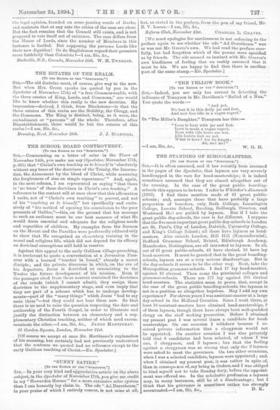THE STANDING OF SCHOOLMASTERS.
[To THE EDITOR OF THE " SPEOTATOII."] Sut,—It is often assumed, and it has recently been assumed in the pages of the Spectator, that laymen are very severely handicapped in the race for head-raasterships ; it is indeed sometimes assumed that they are almost altogether out of the running. In the case of the great public boarding. schools this appears to be true. I refer to Whitaker's Almanack (1893). I find there mention made of 61 great public- schools ; and, amongst those that have probably a large proportion of boarders, only Bath College, Leamington College, Loretto School, Reading, Sedbergb, Tiverton, and Westward Ho! are guided by laymen. But if I take the great public day-schools, the case is far different. I suppose that the five most important great public day-schools in London are St. Paul's, City of London, Dulwich, University College, and King's College School ; all these have laymen as head- masters. Also outside London, Mill Hill (Nonconformist), Bedford Grammar School, Bristol, Edinburgh Academy, Manchester, Nottingham, are all intrusted to laymen. In all, out of 61 great public-schools, 43 have clerical, 18 have lay head-masters. It must be granted that in the great boarding- schools, laymen are at a very serious disadvantage. But in the day-schools it seems to be the other way. Next, take the Metropolitan grammar-schools. I find 17 lay head-masters, against 16 clerical. Then come the provincial colleges and grammar-schools. There are 177 lay against 205 clerical head-masters. The statistics seem to prove that, except in the case of the great public boarding-schools, the layman is not in a position so altogether hopeless. May I add my own experience P For eleven years I was assistant-master at a large day-school in the Midland Counties. Since I went there, at least 10 assistant-masters have obtained head-masterships, of them laymen, though there have always been well-qualified clergy on the staff seeking promotion. Before I obtained my present post I was several times a candidate for head- masterships. On one occasion I withdrew because I re- ceived private information that a clergyman would not be appointed. On another occasion I was also privately told that 6 candidates had been selected, of whom I was one, 3 clergymen, and 3 laymen ; but that the feeling against a clergyman was so strong that only the S laymen were asked to meet the governors. On two other occasions, when I was a selected candidate, laymen were appointed ; and, when I obtained my present post, it was rather in spite of, than in conseqru nee of, my being in Orders, and I was obliged to bind myself not to take Sunday duty, before the appoint. ment was offered me. In the scholastic profession a layman may, in many instances, still be at a disadvantage ; but I think that his grievance is sometimes rather too strongly






































 Previous page
Previous page